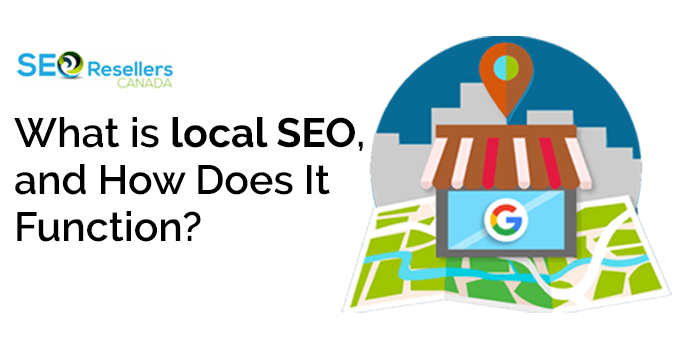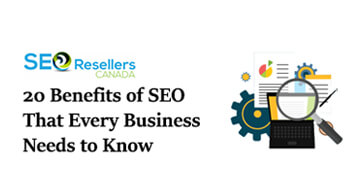Advertising was a simpler task in the past; all you had was a single medium – print, and all you did was pay a sum of money for some space in print publication. The print ad would get the word out to customers, who would then buy the advertised offering, resulting in sales for the advertiser. However, all that is in the past. Advertising has changed with the emergence of the internet and the ubiquity of internet-enabled devices.
Online advertising isn’t simple by any stretch of the imagination as you’ve got a staggering amount of options – display advertising paid videos, paid social media marketing, and so on.
So many advertising mediums can be overwhelming for business owners and marketers. If you ever felt frustrated at your lack of knowledge when it comes to online marketing, you’re not alone. Out of all the various types of online ads, there is one type that every marketer and business owner must be familiar with, and that is paid search marketing.
Never heard of it? That’s not your fault because paid search marketing is known by several names and abbreviations (PPC advertising, Pay-Per-Click, PPC Search) in the marketing and advertising industry.
If you’ve got questions about paid search and want to understand how paid search marketing works, you’ve come to the right place as we’re going to get down to brass tacks in this guide.
1- What Is Paid Search Advertising?
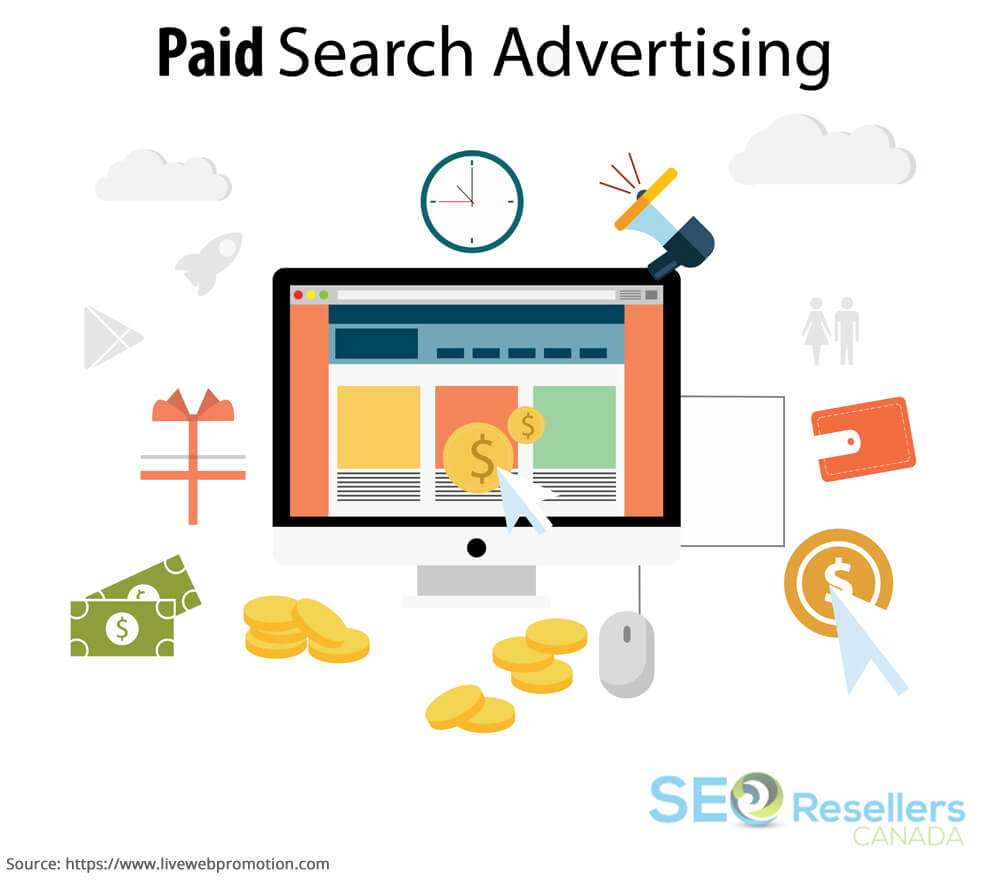
Paid search marketing or PPC advertising is a form of advertising where the business pays a fee every time a user clicks on their ads. There are various platforms that offer PPC advertising, most notably Facebook and Google. In this guide, we’re going to strictly focus on the most popular form of PPC advertising – paid search marketing or paid search advertising.
Paid search advertising involves placing PPC ads on search engines such as Google and Bing. Businesses will place bids on ad placement to appear as a sponsored link on the search engine results page. When users search for relevant keywords that the business has optimized for their ad campaign, the business’s PPC ad is going to appear on top of the page for their search query.
Here is how PPC ads will appear on the search engine when users type in a phrase or keyword that is related to the products or services the business provides or sells.
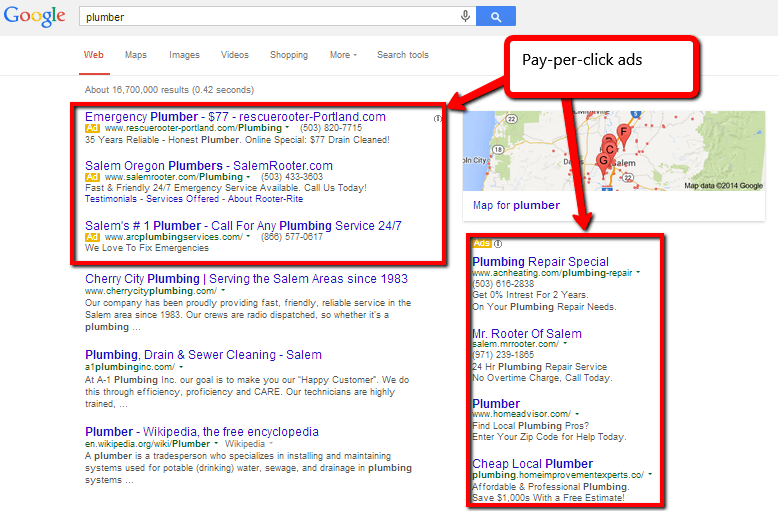
You should remember that every time a user clicks on your ads, you’ll be paying the search engine a fee for the ad placement. This fee is minimal compared to the money that you’ll be generating through sales as you can strategically target the right audience. The more relevant your paid search marketing campaign, the smaller the amount of fee for each click.
Paid search marketing is one of the best ways for small businesses to drive more traffic to their website through ads instead of relying solely on organic content. According to a report from eMarketer, paid search is the fastest-growing ad format in the retail and eCommerce industries. It was also revealed that advertisers in the US spent nearly $13.15 billion dollars on paid search in 2019 alone!

That’s an astonishingly high number, as it’s a 23% increase in paid search advertising compared to last year. That figure is forecasted to increase by a further 16% in 2020, which clearly indicates that you should be focusing your efforts on paid search marketing next year.
It’s important to spend time on organic SEO, but the reality is that SEO doesn’t offer results overnight. However, paid search marketing campaigns on Google will help you drive immediate traffic to your website.
2- Why Should You Use Paid Search Marketing?
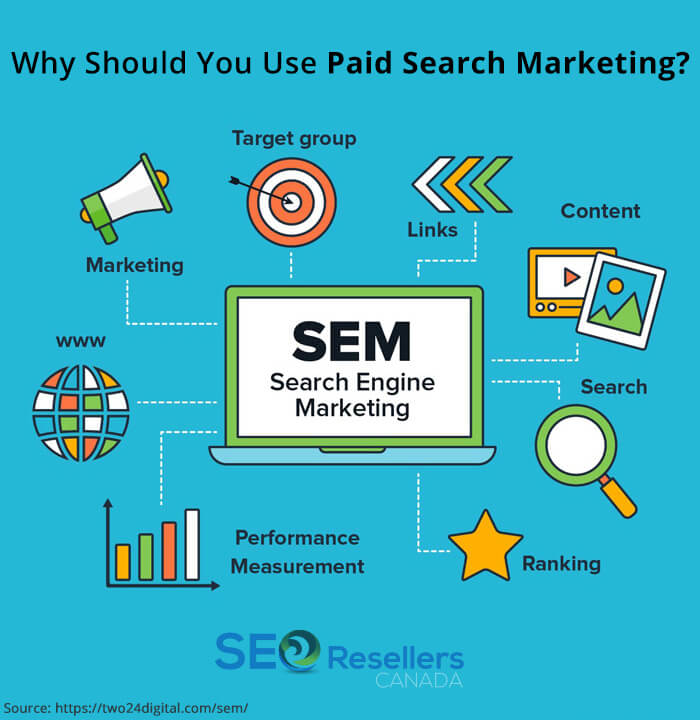
The main reason why you should start focusing on paid search marketing is that paid search allows your company’s offering or brand to appear at the very top of the search engine results page. Getting your website ranked organically on search engines is important, but it requires a lot of your time and effort before you get your desired results. Remember that your competitors are also vying for the same results through their organic SEO campaigns.
Paid search marketing, on the other hand, guarantees that your ads will appear on top of the search engine results page, and it’s even more important on mobile as the smaller screen ensures that all eyes deviate immediately to the top placed ads. Numerous surveys have revealed that most searchers can’t tell the difference between a paid search result and an organic search result.

According to a 2016 data report published by Ofcom found that less than 50% of adults could identify sponsored search results as paid ads. This shows that there isn’t any difference in the user’s willingness to trust paid search results over organic search results.
So, if you’ve got the budget, paid search advertising is the fastest way to get to the top and market your brand. Tracking is also easier in paid search advertising. You don’t gamble on ads because, with paid search, every keyword and money spent on the ads can be tracked. Therefore, testing different campaigns becomes easier for advertisers, helping them refine their promotional messages until they find the ones that work best.
Furthermore, advertisers can access the affiliate network products and websites of the search engine. They also get the ability to schedule ads and target them to specific time and locations. These flexible options make the appeal of paid search marketing quite clear.
3- Reasons Why Small Businesses Should Choose Paid Search Marketing
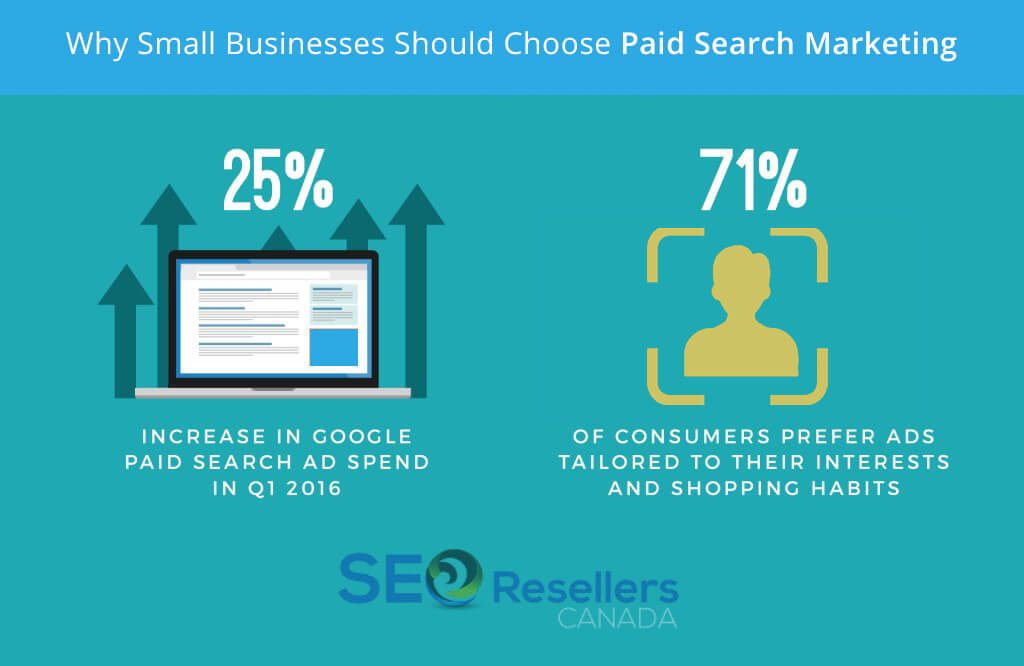
Small businesses that are struggling to generate leads or drive traffic to their website should consider paid search marketing. A research report by PPCHero revealed that nearly 80% of brands claim that PPC is a major lead generator and traffic driver for their business. The same report also revealed that a staggering 96% of marketers spend money on paid search marketing.
The average business in the United States earns $2 for every $1 they spend on Google AdWords, which is why paid search advertising on AdWords has become an integral part of the marketing strategy for most businesses today. So, do you need paid search marketing for your business? Here are some reasons why it’s a good idea for your brand to invest in paid search advertising:
3.1- Get Faster Results
It’s not a secret that organic search engine optimization efforts don’t produce instant results, and it takes time before the efforts start bearing fruit. Paid search marketing, on the other hand, produces instant results as you get immediate traffic to your website, directly from the search engine. That is what makes paid search marketing so effective, especially when you combine it with your organic SEO efforts.
3.2- Generate Qualified Leads
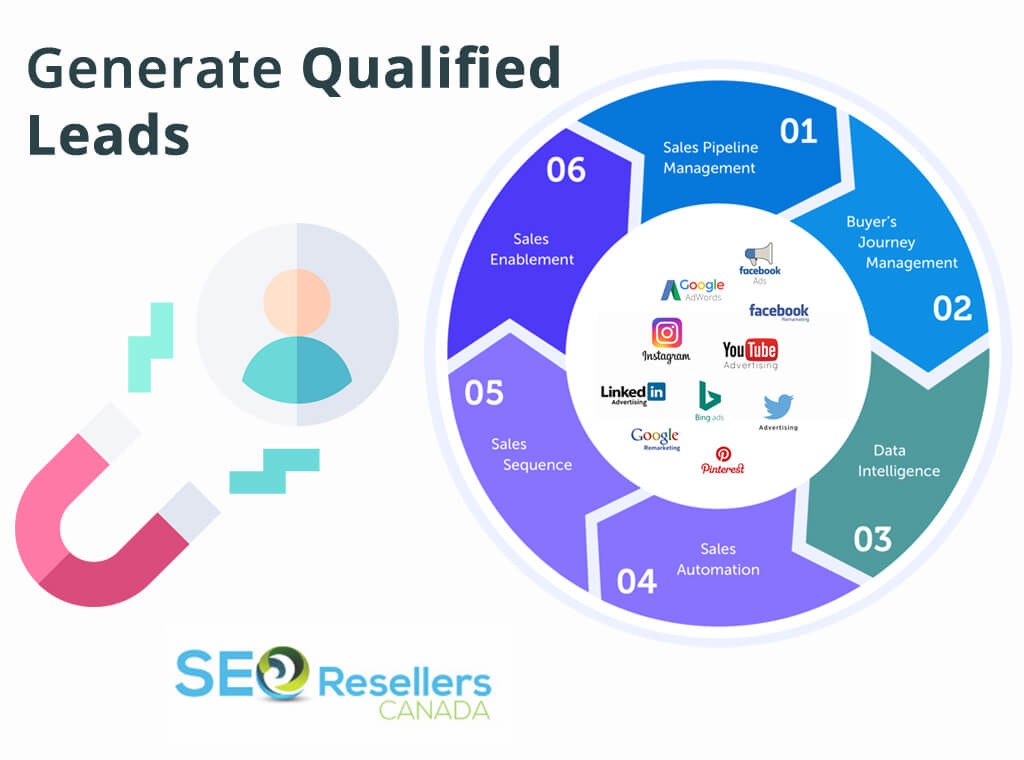
Another major reason why you should consider paid search marketing is because they help small businesses bring high-quality leads that convert into sales. Paid search advertising allows you to strategically target the ideal customers who will be interested in your products or services, ensuring that the traffic driven to your website is qualified.
3.3- Track and Measure Results Easily
Paid search marketing isn’t risky, and the best part is that you can track and measure every aspect of your PPC ad campaign, including the cost per click, the number of clicks, and how many sales were generated through these clicks. The ability to measure even the smallest metrics of your ad campaign help you better use your advertising budget and find ways to improve your results.
3.4- Improve Brand Recognition
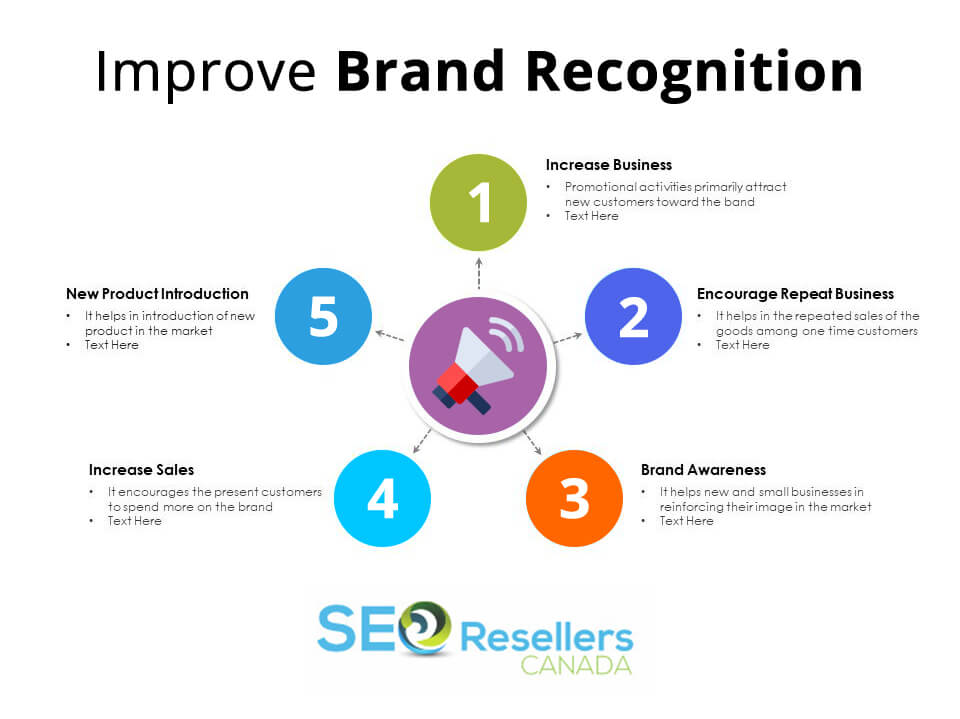
Paid search marketing on Google is one of the best ways to improve brand awareness. When users search for related industry keywords, your brand’s name and a website link are going to appear. This builds brand recognition as more users will become aware of your business, which will increase your chances of lead generation and future sales.
3.5- Perfect for Local Search
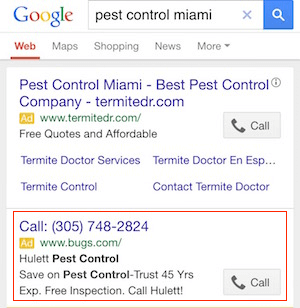
Most small businesses target customers that are near their business location, and paid search advertising offers one of the best ways to target local traffic. Your PPC ads will appear on the search results when users search for stores nearby on their mobile devices, along with directions to your location. There’s even an option on mobile ads for users to call your location straight from the ad.
4- How Does Paid Search Marketing Work?
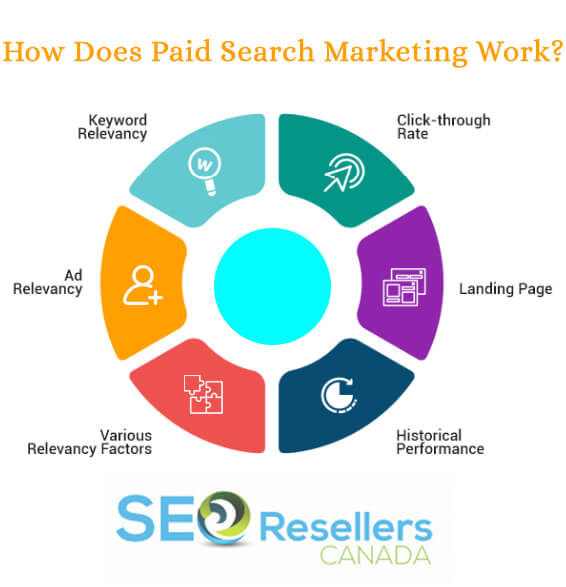
Paid search marketing is a science on its own. Businesses place bids on keywords related to their industry that they want their advertisements to show up for. Paid search ads will appear based on an auction, which will determine which of your ads are shown and where they are shown.
There are several factors that determine where your ad will rank from the relevance of the advertisement to the searcher’s query to the landing page and more. The formula for calculating the rankings of PPC ads in the search results is:
4.1- Ad Rank = Bid x Quality Score
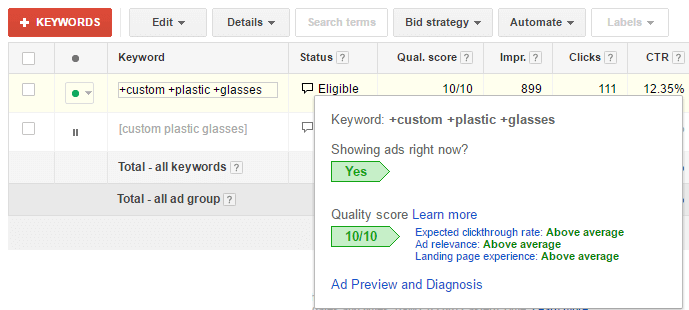
The quality score refers to how useful and relevant the ad is for the end-user. The real formula to determine the quality score is a secret because advertisers don’t know what Google takes into account.
This is purposely done by Google so that advertisers can’t cheat by only focusing on those metrics. However, there are three main components that go into the quality score:
- Ad Relevance– How relevant is your ad to the search query?
- Landing Page Experience– How relevant is the page where you send ad traffic to the search query and is it easy to use for people, including things like load time and mobile-friendliness.
- Expected-Click-Through Rate (CTR)– Google estimates how likely your ad is to be clicked by users based on your historical performance.
Studies have already shown that users who click on paid search ads are 50% more likely to buy a product or service compared to visitors who come to your website organically.
5- What Metrics Should You Measure?
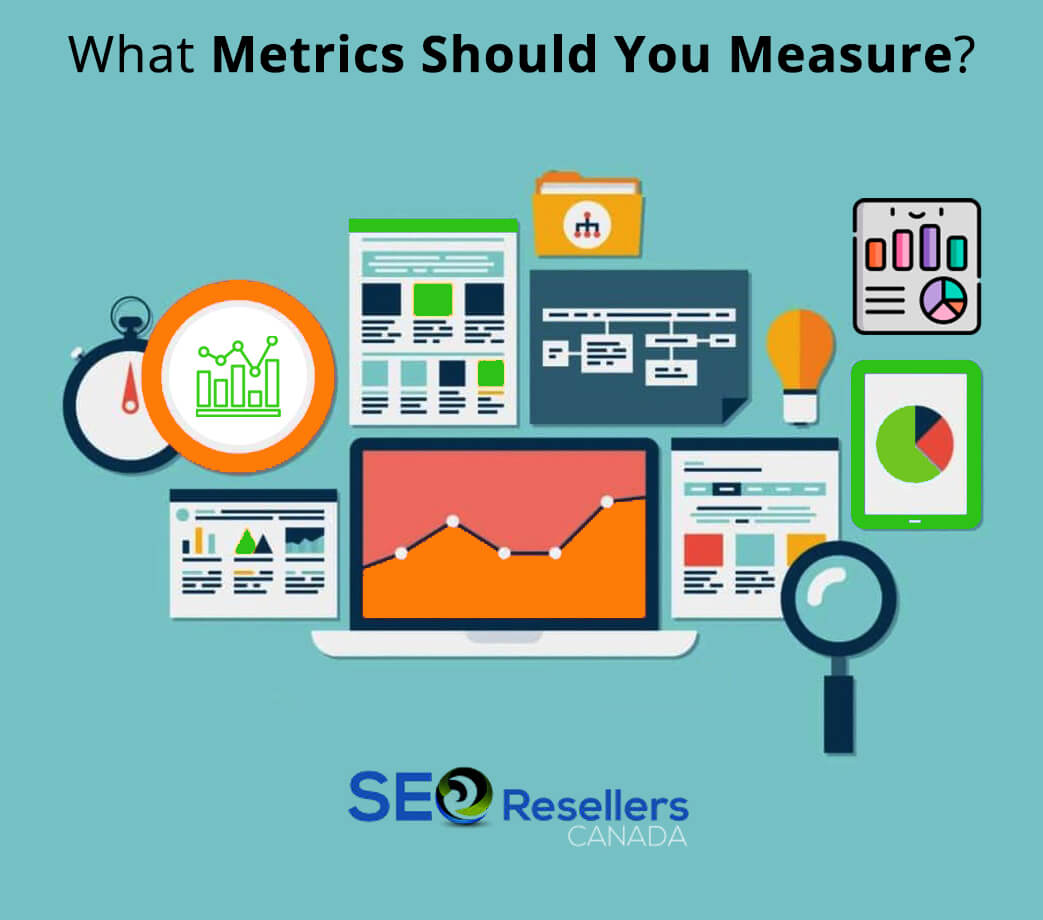
In Google AdWords, you’ll be paying Google a small sum every time a user clicks on your ad, meaning that you’ll pay-per-click for your advertisement. Most people assume that CPC (cost-per-click) is the most important metric to measure in your marketing campaign on Google AdWords because the cheaper every click is, the more clicks you get for your budget. So, the more people clicking on your ad will mean the more sales you’ll end up making.
Even though CPC is an important metric to measure, it’s not the only one you should be looking at because there is another metric that is equally, if not more important, and that is the quality score. This metric determines your final CPC, and the higher the quality score your paid search ads have, the lower your CPC is going to be. That’s the reason why this is the metric you should pay the most attention to.
Your quality score will be calculated using the following factors:
5.1- CTR (Click-Through-Rate)
The click-through rate is calculated by the percentage of people who have clicked on your ad from the number of people who viewed your ad. For instance, if 1000 people viewed your ad, but only 50 of them clicked on the ad, it means your CTR is 5%. The higher the CTR, the more engaging your ad is, and the more it contributes to your quality score.
5.2- Ad Relevance
Your ads should include relevant keywords that relate directly to the words your target audience is using to search for your products or services. That ensures your ads are shown to the most relevant users, further increasing your CTR.
5.3- Landing Page Experience
When users click on your ads, they will be taken to a specific webpage, and it’s your job to optimize the webpage to ensure it fulfils the promise and claims you’ve made in your ad. Make sure that the ad corresponds with the landing page to decrease the bounce rate, which will contribute to your quality score as well.
You should remember that even though these major factors influence your quality score, they’re not the only ones. Only Google knows what other factors are taken into account by its algorithm when deciding the overall quality score of a paid search ad.
6- The Importance of Choosing the Right Keywords for a Successful Ad Campaign
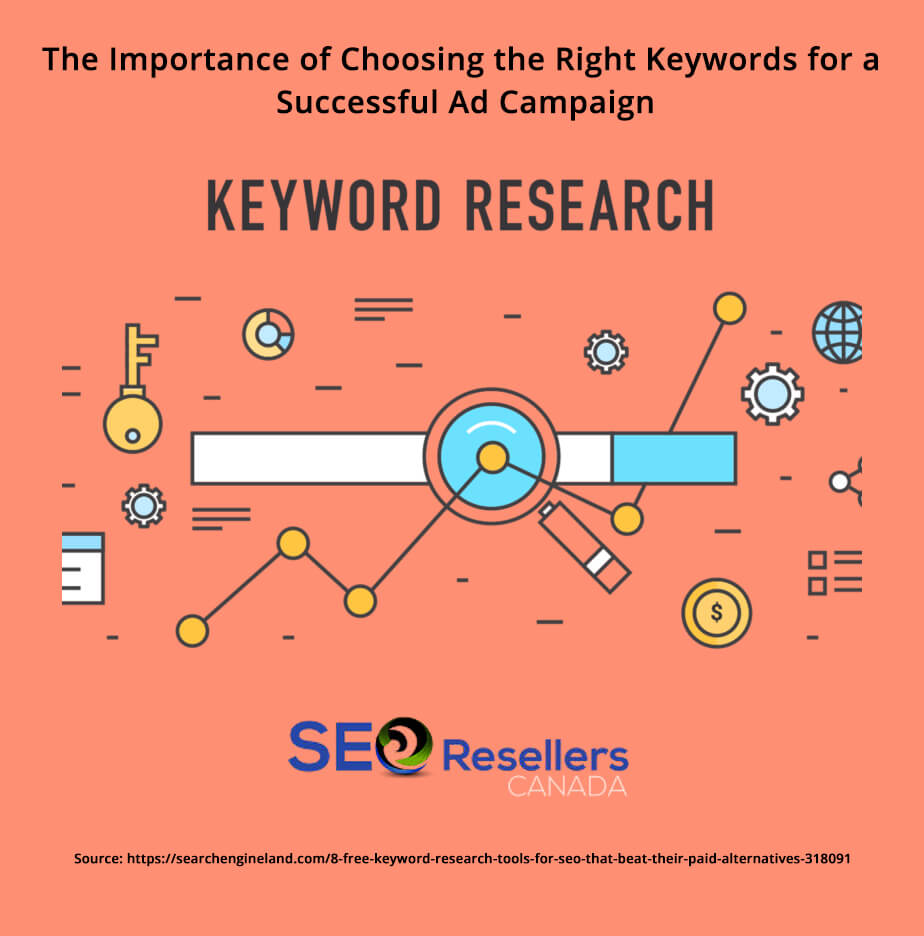
Before you go ahead and splash the cash on advertising, you must first find out whether there is any demand for your products. That is business 101, and in Google AdWords, you can do this by checking whether keywords related to your products or services get the most searches.
For instance, say you’re advertising a pair of sports shoes for football players. In this instance, you want to target your ad to users who are footballers and are searching for football shoes on Google. So, you must optimize your ads with keywords that the audience is searching for, which in this case is going to be football shoes for players. Here are some ways you can find relevant keywords for your ads:
- You can brainstorm a few keywords and put them into the free keyword planner by Google to check how many searches that keyword is getting. Combine this with the CPC rate to decide which keyword is the most popular in searches and will get the most views for your ads.
- You can also check what keywords your competitors are using to optimize and rank their ads to gain some idea of which keywords you should be targeting.
- You can also target long-tail versions of the keywords, so if the keyword is football shoes, you can optimize your ad with long-tail versions, which would be ‘football shoes for kids,’ and ‘football boots Nike.’
To find the right keywords for your paid search ad, you will need to A/B test the same ad for different keywords to find one that gets you the most clicks.
7- The Crucial Components of a Paid Search Advertisement
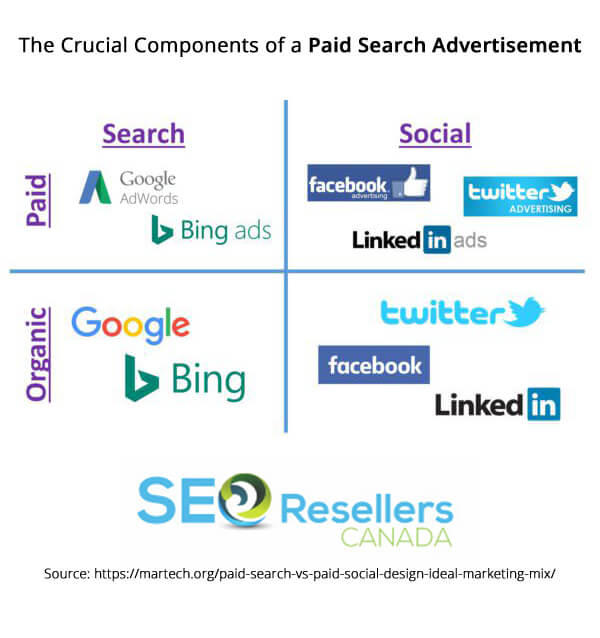
You will notice that when you type a query into Google, every ad that appears on top of the search results page is a text ad without any videos, images, or graphics. You may wonder how effective these ads are, and the answer is a simple one; they are very effective.
Wordstream states that the top 3 paid ads get 41% of all clicks for keywords that have a commercial or buying intent. So, when people search for specific product listings, the ads that appear are going to get around 65% of all clicks. That’s because, for these keywords, the ads will take most of the space, and organic search results are pushed below the fold.
Now that you know how effective these ads are, we’ll look at the components of every ad that you should be focusing on.
7.1- Headline
The headline should be bold as it gets the most attention in the ad, and you’ll need to ensure that it is compelling enough to attract and engage readers.
7.2- Description lines 1 & 2
The description lines 1 and 2 are there so you can reiterate the benefits of your products and services, and showcase any promotion or offer while explaining your USP (unique selling point). It’s advised to keep the description short and sweet.
7.3- Display URL
Don’t waste this space by inserting a numbered URL but create a custom URL that specifies the benefits of your product in its address. Keep the URL simple because it helps people remember if they want to revisit your website later. Don’t waste space by focusing on your company’s name. Instead, you should focus on stating the key benefits of your product to make your ad more compelling and persuasive.
Apart from focusing on your paid search ad’s copy, you should also tinker with other things to improve the effectiveness of your online ad. Here’s what you should do:
Time
The times your ads are displayed matter a great deal as most of your target audience may be searching for your products in the evening, so it doesn’t make sense to run your ads in the early morning.
Bidding Price
You should know that bidding higher is going to put your ads in a better position in Google search results. So, if you bid lower, your ad will be placed on a lower spot. That may not affect your conversion rates significantly, but it can save you money in the long-run.
Demographics
If your paid search ad is targeting people in a large area, such as your entire country or multiple countries, you should target your ads to people in specific regions. That may increase your conversion rates significantly.
8- Why You Must A/B Test Your Paid Search Ads
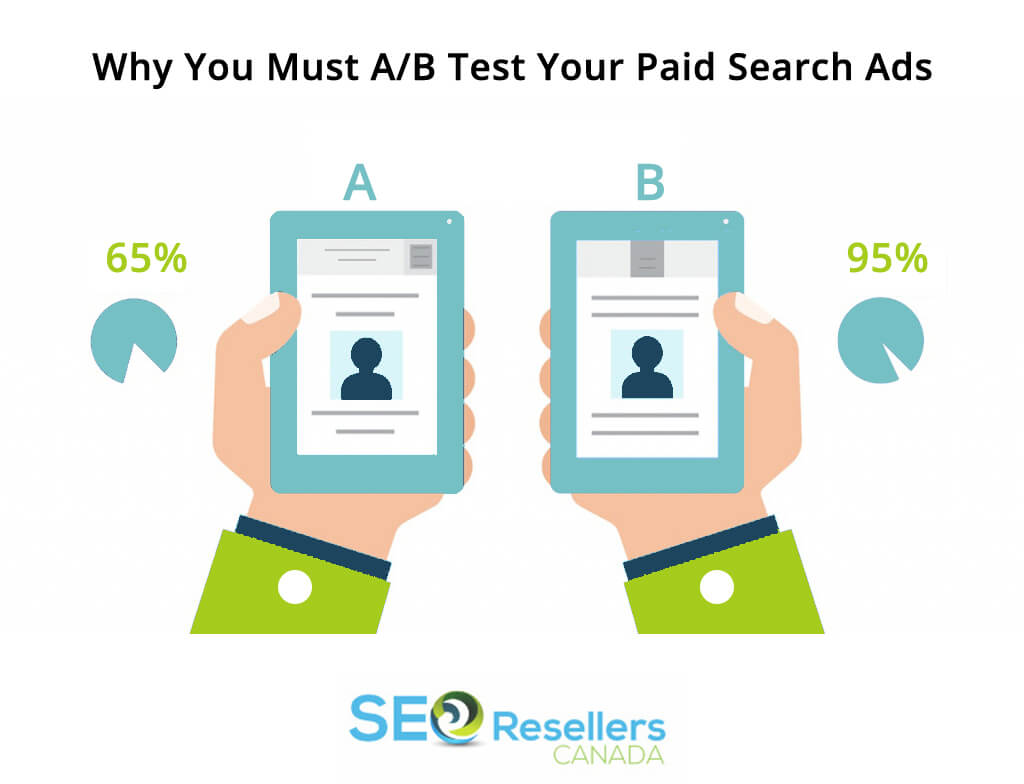
Irrespective of how much of an expert you are, you won’t manage to create the perfect ad if you don’t A/B test different aspects of the ad. We already discussed how you should change your ad settings by time, demographics, and bidding price. A/B testing the ad takes it one step further.
A/B testing your ads allows you to test multiple versions of an ad by creating multiple copies of the same ad with a single variation in it. You should create and test at least three versions of the ad at a time, and the one with the highest conversions should be the one you should choose to display. Some common elements you can change in your ads during A/B testing are as follows:
Landing Page Copy
If a person clicks on your ad and goes straight to your landing page but leaves immediately, it means they didn’t find what they were looking for on the landing page. You should work on your landing page copy to ensure that visitors don’t bounce.
The Offer
An offer inside a paid search ad is the Call-to-Action (CTA), and the more attractive the CTA is, the greater the chances of improving your ad’s conversion rate. You can play around with the wordings, pricing, and discount of your offer to find one that gets you the most clicks.
Product Images
Product ads on Google can have images, and by adding a clear and attractive image of your products, you can improve the click-through rate of your ad.
The Copy
You can change the USPs and benefits written in the ad copy to create more compelling ads that increase the engagement of users with the ad.
The Headline
The most clearly viewed part of your paid search ad is the headline, and you can make changes to the headline to get one that improves your conversion rate.
9- How A Paid Search Marketing Agency Help Your Business?
Google AdWords is going to charge your business money every time a user clicks on your paid search ad on Google. Therefore, you must ensure that your PPC ad campaigns are highly effective. PPC ad management isn’t easy and requires knowledge and experience that most small businesses don’t have in their in-house marketing teams. Therefore, it’s wise to partner with an experienced PPC ad agency, like SEO Resellers Canada, to help create and manage your PPC ad campaigns.
Here are some more reasons why you should be considering hiring an agency like SEO Resellers Canada to manage your paid search advertising campaigns:
You Have Limited Budget for Your PPC Ad
If your business is working with a limited PPC ad budget, you should enlist the help of experts to optimize your campaigns and get the best results. A PPC ad agency has experts on board who know all the right tricks and tactics to help improve conversion rates for your ads.
You Have No Margin for Error
There are a lot of moving pieces in PPC ad management, and the slightest mistake can undermine the effectiveness of your paid search ads. Working with an agency that can identify areas for improvement and make changes to improve your PPC campaign results allows you to not only save money in the long-run but also get the results you want.
You Don’t Have Time
The biggest challenge with PPC ad management is that it takes time because to create effective and optimized ad campaigns, you must spend time researching keywords, staying-up-to-date with best practices in PPC management, and develop ad content. If you don’t have the time to manage your campaigns properly, it’s best that you enlist the services of a professional PPC ad management company.
10- Frequently Asked Questions – FAQs on Paid Search Marketing
We understand that not everyone is familiar with paid search marketing, and there are going to be some questions related to PPC floating in your head. We’ve made things easier by highlighting some of the frequently asked questions on paid search marketing and how it works.
If you’ve got any questions we haven’t answered, please let us know in the comments or reach out to us through our email. Here are the most frequently asked questions for paid search and how it works:
10.1- Does paid search work?
When you compare with other marketing channels, paid search is one of the most effective as it works brilliantly. Wordstream reveals that the average conversion rate in Google Ads for all industries is 3.75%
When you consider that there are nearly 4 billion searches every day on Google, that means over 131 million conversions are taking place through paid search every day!
10.2- How much does paid search cost?
The numbers are different for every industry and keyword phrase, but the average CPC (cost-per-click) in Google is around $2.00. However, there are extremes on both ends, as millions of keywords for e-commerce products will cost you a few cents per click.
On the other hand, millions of keywords in enterprise B2B services or in the legal industry can cost you well over $50 per click. To find out how much paid search marketing is going to cost your business, get in touch with us right here.
10.3- Aren’t paid search results and SEO the same?
No. Paid search results and SEO are not the same things. Google Search Engine Results Pages (SERPs) are structured in a way that allows paid search results to take the first 1-4 positions on the page. There may even be 1-4 of them at the bottom of the page.
In comparison, links on Google SERPs that are placed from SEO efforts are found on the rest of the page.
10.4- What’s the difference between organic and paid search?
The difference between organic search and paid search is explained by how the rankings are acquired.
- In paid search, the rankings will be determined by various factors, including an auction-style bidding system.
- In organic search, the rankings are determined algorithmically by various factors on the page as well as some other ones not related to the page.
These two search platforms don’t affect each other directly, but numerous studies indicate that leveraging both paid and organic search together is highly effective and produces the best results.
11- Conclusion
Paid search advertising is an invaluable digital marketing tactic for small businesses as it helps drive more traffic to your website from search engines and ensures that you target the right audience. PPC ads directly influence your bottom line. However, they require investment, and when implemented properly, these ads can offer small businesses an outstanding return on their investment.
Due to the complex nature of paid search marketing, most small businesses prefer to partner with a PPC ad agency that can help them set up and maintain their paid search marketing campaign. Even though Google has made it easier to sign up for Google Ads and start a campaign, you require expertise with PPC ads if you want to optimize your overall ad budget.
SEO Resellers Canada offers PPC ad management services that are designed to improve your visibility on search engines. We have PPC experts who know the ins and outs of paid search ads and focus on developing effective ad campaigns that drive conversions. If you’re ready to start your paid search advertising campaigns, contact us now for a free consultation.
Editor’s Note: This post was originally published on January 03, 2020, and has been completely revamped and updated for accuracy and comprehensiveness.






















